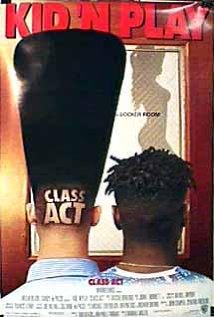
CLASS ACT
US, 1992, 98 minutes, Colour.
Christopher 'Kid' Reid, Christopher 'Play' Martin, Meshach Taylor, Mariann Aalda, Loretta Devine, Ric Ducommun, Rhea Perlman.
Directed by Randall Miller.
There are several meanings in the title of this film, class in the sense of school, class and a sense of class distinctions. There are several meanings also for act, something done and achieved, performance, acting.
The film comes from the early 1990s at a time when there was an increase in American movies portraying African- American stories, many gangster films of the period as well as comedies like Sister Act.
The stars of this film have played together in a number of comedies including the House Party series and have continued performing for over 20 years.
The premise of the film is rather simple. On the one hand we see a youngster growing up in tough neighbourhoods, his mother trying to cope with him, his doing all the wrong things, mixing with all the wrong people, growing up into teenage and finally landing in jail. This is Blade, played by Christopher Martin. On the other hand, there is a very wealthy family, one child, the parents inordinately proud of their son, Duncan, who in fact has a very high IQ. He also has a most peculiar vertical hair-do, seen in the House Party films, as played by Christopher Reid. He is clever as a child, clever as a teenager, very well spoken, prim and proper, lacking in worldly ways. He is to do his final year at a local school and get a scholarship for further studies. The school welcomes such a brilliant student.
Over the decades there have been many identity mix-up films. The mix-up here is rather contrived when the principal of the school finds that the documents for each of the students have been reversed as they were knocked out of someone’s hand and scattered on the floor. He is very welcoming to Blade and places him puts into advanced classes (and one of the teachers is Rhea Perlman).The principal is very dismissive of Duncan and put him with the detainees who pay no attention to a poor teacher trying to teach them about transitive and intransitive verbs.
As might be expected, the real Blade, has to try to manage in advanced classes, helped by the teachers who interpret his slang and ideas as brilliance, attracted to one of the female students. On the other hand, the real Duncan has to make his mark and to get a good PE score. At football, when he calculates wind force and other factors, he is an expert goalkicker. One of the girls is attracted to him as well.
The real Blade has to teach Duncan survival techniques as well as social techniques – and rearranging his hair. He begins to respond with the exuberance. The real Duncan has to help Blade with his studies. They form a friendship, actually work well in keeping up the pretence, Blade actually bringing a flower to his mother to her astonishment, Duncan’s parents continually amazed at what is happening but not intervening, and finally happy when they find their son in bed with his girlfriend. It is that kind of film.
This was also the period of films like The Revenge of the Nerds and is a variation on the theme. It was directed by Randall Miller who directed a number of television films in the 1990s and the next decade but moved into feature films with Nobel Son, CBGB.